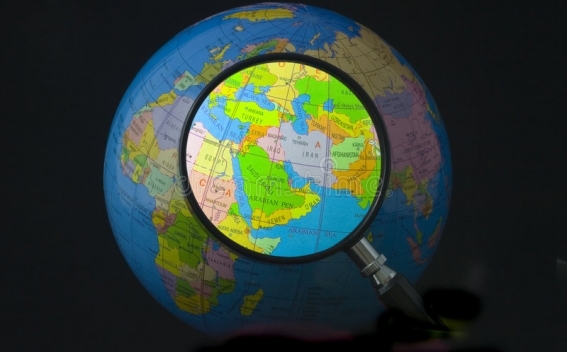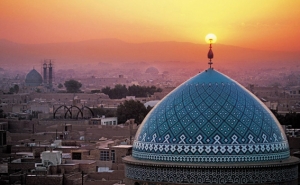Summing up 2017: Middle East Continues to be One of the Hottest Regions in the World

In 2017, the Middle East continued to be one of the hottest regions on the planet. Not only the existing conflicts in the region failed to be resolved, but also new regional crises started. We will present below the main developments in the Middle East in 2017.
1. Fight against IS in Syria and Iraq
2017 was quite effective in the fight against the Islamic State terrorist organization in Iraq and Syria. Thus, in 2017, with the support of the US-led international coalition, the Iraqi army succeeded in rebuilding the country's second largest city, Mosul, which was considered the "capital of the IS" in Iraq. Iraqi forces succeeded in releasing Tel-Afar, Haiyan, Al-Qaim and the border with Al-Jazeera in Syria. With these victories, Iraq ended the three-year bloody war against ISIS, which was officially announced on December 9 by the Iraqi Prime Minister Haydar al-Abadi.
Syria also announced the end of the war against the IS, after which Russia announced the withdrawal of most of its troops from Syria. It should be noted that with the support of Russia's air-cosmic forces, Assad's troops were able to restore their control in Der-Zor, Palmira, Abu Kamal and other settlements in 2017. However, it should be noted that unlike Iraq, the territories under the control of IS in Syria have not fully passed to the Damascus control. Thus, Rakka, ''the capital of IS'' in Syria was liberated by the US-led international coalition with the help of Kurdish mercenaries, and the city is now under their control.
Thus, in 2018, Syria will face not only the guerilla fighters of the ISIS, but also, unlike Iraq, it will have to regain its power in areas controlled by other terrorist groups, armed opposition (Idlib) and the Kurds (Rakka, Kobani, Afrin).
2. Syria's political settlement in 2017
2017 ended with positive tendencies in the political settlement of the Syrian conflict. Despite the fact that in the beginning of the year, when Trump came to power, there was some optimism for success in the political settlement due to the pre-election statements of Trump, the use of chemical weapons in Idlib, of which the West accused the Assad army and its subsequent missile strikes towards the Syrian government airbase forces, had quite a negative impact on the negotiations.
In 2017, the sides failed to make substantial progress in the Geneva-based inter-governmental dialogue under the auspices of the United Nations (3 rounds). Instead, the year was a success in the steps towards political settlement within the Astana format. Thus, within the framework of the Astana process, Russia, Iran and Turkey succeeded in reaching agreement on the establishment of ceasefire in Syria, and then on establishing peace zones. Another major achievement in terms of political settlement in 2017 is that the international community, including the United States and Turkey, no longer claims Assad's immediate resignation.
As a result, a good background was created to return to discussions on a political settlement. In this context, the meeting between Russian and Syrian Presidents Vladimir Putin and Bashar al-Assad was important in Sochi, followed by Putin's discussions with the Presidents of Turkey and Iran, as well as with leaders of other countries interested in the Syrian conflict, including Trump. It should be noted that the above-mentioned discussions following the meeting between Putin and Assad in Sochi were positively assessed by all sides, which gives some optimism from the point of view of possible progress in 2018.
3. Erbil-Baghdad relations in 2017
2017 was strained for relations between Iraq and Iraqi autonomous Kurdistan region, due to Kurds' intention to hold a referendum on independence. The tension escalated when ignoring central authorities' claims, the authorities of the autonomy, nevertheless, held a referendum on independence on September 25, and 95% of the population voted for independence. Calling Kurds to cancel the referendum results, Baghdad imposed a number of restrictions on autonomy (i.e. control of the central authorities over airports and border checkpoints), and then launched a military operation in disputed areas that are not part of the autonomy, but are under the control of the Kurds. Perhaps the risk of losing the oil-rich city of Kirkuk made the Iraqi Kurdistan authorities cancel the referendum results and try to start a dialogue with Baghdad.
4. Israeli-Palestinian conflict in 2017
2017 was also strained for Palestinian-Israeli relations. In January 2017, an attempt was made to bring the Palestinian-Israeli peace talks out of the deadlock, convening an international conference on the Middle East settlement in Paris with the participation of representatives from 70 countries. However, Israel boycotted this congress. Moreover, in February, Israel passed a law that legitimized the construction of Jewish settlements in Palestinian territories under its control, which seriously causes grievances among the Palestinians and is criticized by the international community.
The next serious blow to the resumption of peace talks was the toughening of security measures by the Israeli authorities at the entrance to the Temple Mount. Particularly, on July 14, Israel set up metal-based devices at the entrance to the Muslim holy place and restricted the visitors as a response to Palestinians' attack on Jewish forces. It caused serious dissatisfaction among Muslims, leading to clashes between the Palestinians and Israelis. As a result, Israel had to cancel this kind of activities.
Another reason for the clashes between the Palestinians and Israelis was the December announcement of US President Donald Trump, who recognized Jerusalem as the capital of Israel. This increased tension not only between the Palestinians and the Israelis, leading to clashes, but also between the Muslim world and the United States.
5. Yemen crunch in 2017
2017 was not good enough in terms of the settlement of the conflict in Yemen. Conflict is so intensified that Hutu-rebels launched missiles in the direction of Saudi Arabia, heading the Arab Coalition to support the Yemeni president.
In late November, Yemen's former president Saleh attempted to resolve the conflict, stating that he was willing to leave the alliance with the Hutu-rebels and to negotiate with Saudi Arabia. However, three days after this statement, Saleh was killed by the Hutus.
It should be noted that as a result of three years of civil war more than 10,000 civilians were killed in Yemen, millions were forced to escape from the country, which is facing a serious humanitarian catastrophe.
6. Saudi Arabia-Iran relations in 2017
The confrontation between Saudi Arabia and Iran in 2017 was quite acute, mainly due to the strengthening of Prince Mohammed bin Salman's rule in Saudi Arabia and his appointment as the Crown Prince as a result. According to various sources, Saudi Arabia made an alliance with Israel to fight against Iran. Even the Crown Prince visited Israel in the absence of diplomatic relations.
The Saudi-Iranian confrontation continued in Yemen in 2017, where Riyadh waged a war against the Hutu-rebels (sponsored by Tehran according to Saudis) in Syria, where Saudi Arabia sponsors the fight against Iran's ally Bashar al-Assad.
This year the Saudi-Iranian confrontation was also felt in Lebanon, when Prime Minister of the country announced his resignation in Riyadh, accusing the Iranian-backed Hezbollah movement of destabilizing activities in the region and assassination attempt against him. Fortunately, Beirut managed to overcome this crisis.
7. Crisis around Qatar in 2017
The Saudi-Iranian confrontation has somehow been expressed in the Qatari crisis as well. On June 5, 2017, four Arabian states (Saudi Arabia, the United Arab Emirates, Bahrain and Egypt) announced the abolition of diplomatic relations with Qatar and its air, water and land blockade, accusing Doha of sponsoring terrorism and interfering in neighboring countries. This restriction to Qatar has been maintained so far, as Doha categorically denied all accusations and refused to comply with the demands of the Arab Quartet (stopping terrorist financing, interfering in the internal affairs of other countries and fulfilling the 13 requirements for strengthening the fight against terrorism, including shutting down the Al Jazeera TV channel, breaking relations with Iran). Experts say the crisis which has been unprecedented for the Gulf monarchies' is the result of Saudi Arabia's policy of establishing its sovereignty in the region, which, to some extent, has succeeded. Despite the policy of the Arab Quartet, which, by the way, has been joined by a number of other countries, Qatar did not break its relations with Saudi Arabia's main rival Iran, but Doha's activity in regional politics has dropped dramatically. At the same time, the Qatari crisis was a serious blow to the Persian Gulf Cooperation Council, a result of which was signing of the new separate alliance between Saudi Arabia and the United Arab Emirates.
-
 17:08
17:08The regular session of the Anti-corruption Policy Council takes place in Jermuk
-
 15:05
15:05The Prime Minister sends congratulatory messages to the supreme leader of Iran and the President of Iran
-
 11:11
11:11Armenia sends earthquake aid to Turkey
-
 10:43
10:43Commemoration of the Pontiff St. Sahak Partev
-
 09:16
09:16Some roads are closed and difficult to pass in Armenia
-
 19:55
19:55Phone conversation of the Foreign Minister of Armenia with the U.S. Assistant Secretary of State for European and Eurasian Affairs
-
 18:30
18:30Prime Minister Pashinyan and President Khachaturyan meet
-
 18:20
18:20Ararat Mirzoyan with Co-Chairman of the OSCE Minsk Group of France Brice Roquefeuil
-
 17:01
17:01Humans could land on Mars within 10 years, Musk predicts
-
 16:45
16:45France, US urge 'immediate' end to Nagorno Karabakh blockade
-
 16:01
16:01Blockaded Nagorno Karabakh launches fundraiser to support quake-hit Syria
-
 15:59
15:59Earthquake death toll in Turkey rises to 18,342
-
 15:43
15:43Ararat Mirzoyan Held a Telephone Conversation with Sergey Lavrov
-
 15:06
15:06French president rules out fighter jet supplies to Ukraine in near future
-
 14:47
14:475 Day Weather Forecast in Armenia
-
 14:44
14:44President Vahagn Khachaturyan wrote a note in the book of condolences opened in the Embassy of Syria in Armenia
-
 14:20
14:20Azerbaijan’s provocations impede establishment of peace and stability – Armenian FM tells Russian Co-Chair of OSCE MG
-
 12:57
12:57France representation to OSCE: Paris calls on Azerbaijan to restore freedom of movement through Lachin corridor
-
 11:40
11:40Command of Kosovo forces highly appreciated preparation of Armenian peacekeepers
-
 10:16
10:16The United States withdrew from sanctions against Syria for six months the provision of assistance after the earthquake
day
week
month
Humidity: %
Wind: km/h


